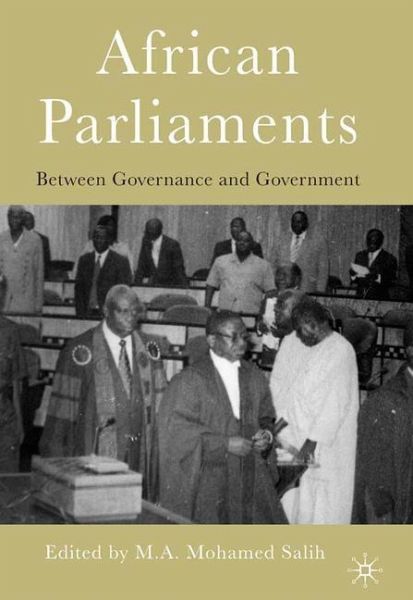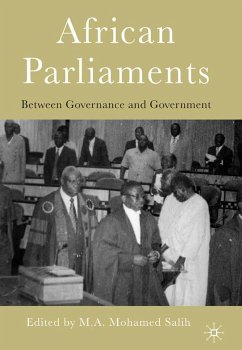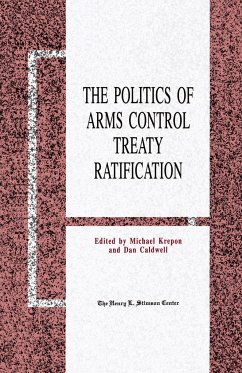
Broschiertes Buch
African Parliaments
Between Governance and Government
Herausgegeben: Salih, M.
Versandkostenfrei!
Versandfertig in 6-10 Tagen
Weitere Ausgaben:

PAYBACK Punkte
19 °P sammeln!





This book offers in-depth analysis of parliamentary development set in a historical context informed by Africa's post-1990s democratic resurgence. In particular, it illustrates how African parliaments are caught between the twin processes of being part of the machinery of government while exercising the function of holding government accountable.
M.A. MOHAMED SALIH is Professor of Politics of Development both at the Department of Political Science, University of Leiden and the Institute of Social Studies, The Hague, The Netherlands.
Produktdetails
- Verlag: Palgrave Macmillan / Palgrave Macmillan US / Springer Palgrave Macmillan
- Artikelnr. des Verlages: 978-1-349-53284-1
- 1st ed. 2005
- Seitenzahl: 308
- Erscheinungstermin: 19. Dezember 2015
- Englisch
- Abmessung: 216mm x 140mm x 17mm
- Gewicht: 389g
- ISBN-13: 9781349532841
- ISBN-10: 1349532843
- Artikelnr.: 45074214
Herstellerkennzeichnung
Palgrave Macmillan
Tiergartenstr. 17
69121 Heidelberg
ProductSafety@springernature.com
'Scholars and policy makers interested in the developments of governance arrangements in Africa have long needed a thorough analysis of the changing role of Parliaments in this dynamic continent. Reading this book will provide an excellent up-to-date overview of changes in the role of African parliaments at national and local levels and across multiple countries. The book also informs us about how African assemblies are continuing to retain an important cultural role while they also change in function over time. A very useful synthesis.' - Elinor Ostrom, Center for the Study of Institutions, Population, and Environmental Change, USA
'Probing, comprehensive, nuanced study of African parliaments and a major contribution to our
'Probing, comprehensive, nuanced study of African parliaments and a major contribution to our
Mehr anzeigen
understanding of Africa democratization. The editor has assembled a top-notch team of African and European scholars; the result is a definitive work on this crucial but understudied topic.' - Thomas Carothers, Carnegie Endowment for International Peace, USA
'This is the first major assessment of developments in African parliaments and fills a huge gap in our understanding of contemporary African governance. Salih and his colleagues are to be congratulated for bringing Africa squarely into the mainstream of comparative study of political institutions. This is a landmark contribution and will be essential reading for students of comparative politics, African politics, and legislative studies.' - Peter Mair, European University, The Netherlands
' 'Parliament has even started to grill ministers.' This unexpected observation was recently made by an experienced commentator during a visit to an African parliament. The present volume presents for the first time a number of such cases of 'grilling' and documents a significant new trend in African parliaments strive to change the prevailing imbalance of power between governor and governed.' - Holger Bernt Hansen, University of Copenhagen, Denmark
'The discussion if democracy is suitable for Africa has moved on to the discourse how the performance of democratic institutions in Africa can be improved. Parliaments and political parties are generally not functioning very well. For democracy to deepen and to contribute to social cohesion of societies, parliaments and political parties are essential building blocks. This timely book provides valuable insights for all those on the African continent who are interested in making democracy work and delivering governance that care for the well-being of its people.' - Roel von Meijenfeldt, Executive Director of the Institute for Multiparty Democracy (IMD), The Netherlands.
'This is the first major assessment of developments in African parliaments and fills a huge gap in our understanding of contemporary African governance. Salih and his colleagues are to be congratulated for bringing Africa squarely into the mainstream of comparative study of political institutions. This is a landmark contribution and will be essential reading for students of comparative politics, African politics, and legislative studies.' - Peter Mair, European University, The Netherlands
' 'Parliament has even started to grill ministers.' This unexpected observation was recently made by an experienced commentator during a visit to an African parliament. The present volume presents for the first time a number of such cases of 'grilling' and documents a significant new trend in African parliaments strive to change the prevailing imbalance of power between governor and governed.' - Holger Bernt Hansen, University of Copenhagen, Denmark
'The discussion if democracy is suitable for Africa has moved on to the discourse how the performance of democratic institutions in Africa can be improved. Parliaments and political parties are generally not functioning very well. For democracy to deepen and to contribute to social cohesion of societies, parliaments and political parties are essential building blocks. This timely book provides valuable insights for all those on the African continent who are interested in making democracy work and delivering governance that care for the well-being of its people.' - Roel von Meijenfeldt, Executive Director of the Institute for Multiparty Democracy (IMD), The Netherlands.
Schließen
Für dieses Produkt wurde noch keine Bewertung abgegeben. Wir würden uns sehr freuen, wenn du die erste Bewertung schreibst!
Eine Bewertung schreiben
Eine Bewertung schreiben
Andere Kunden interessierten sich für













